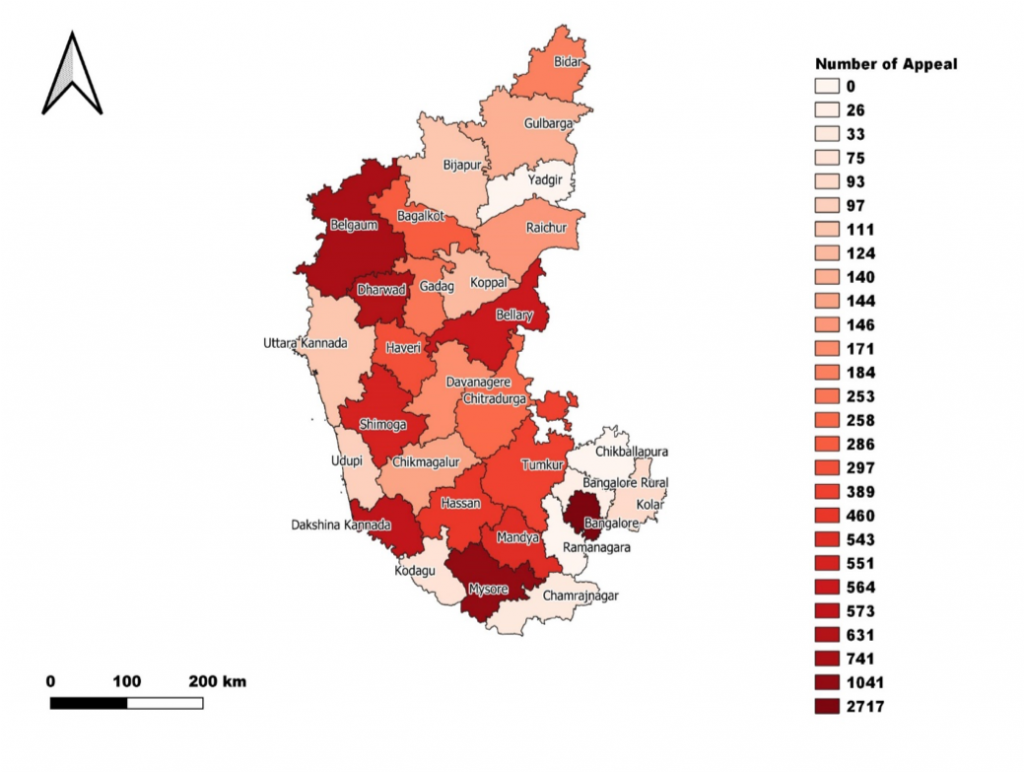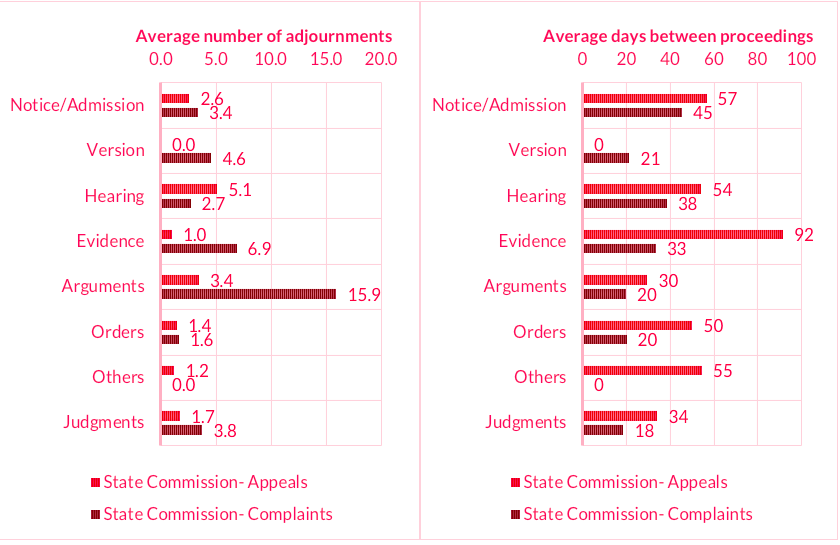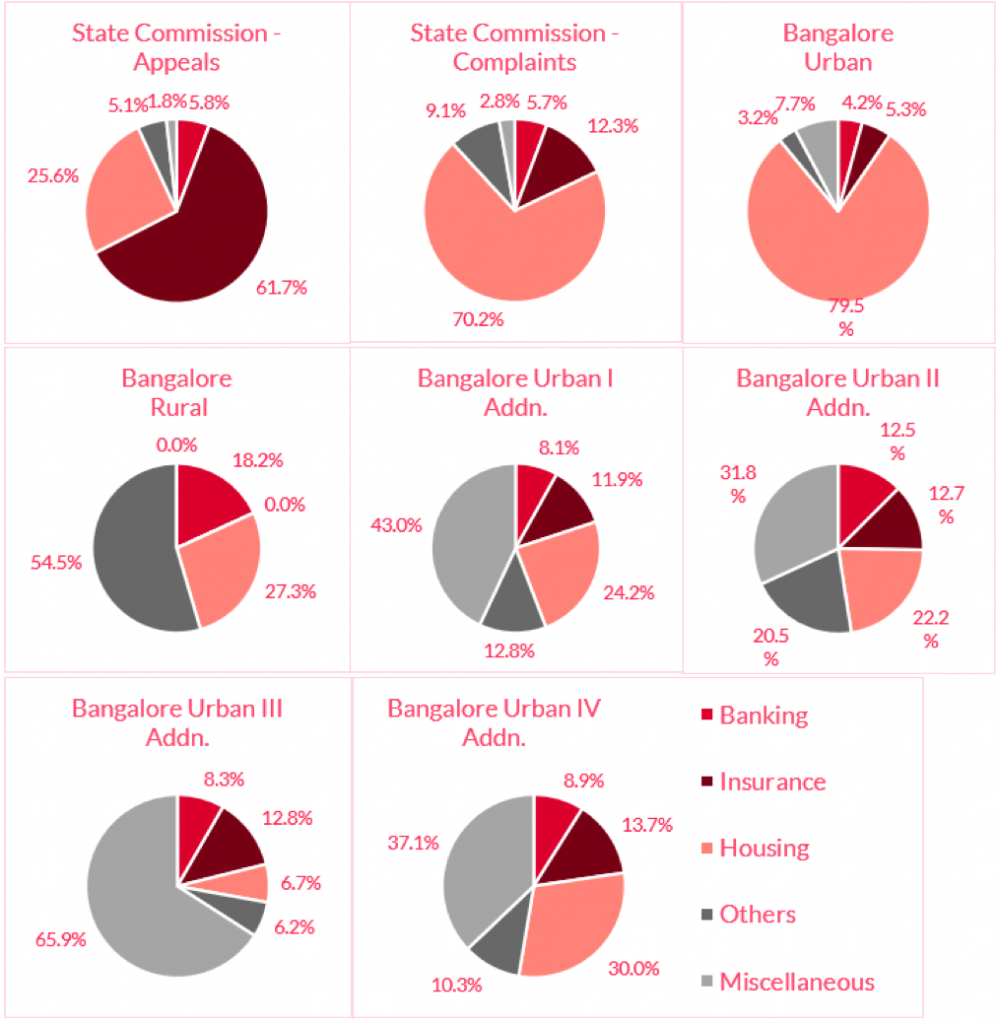
Enforcing Caveat Venditor
An evaluation of Consumer Dispute Redressal Commissions in Karnataka
Summary: The report evaluates the functioning of the Consumer Dispute Redressal Commissions in Karnataka and recommends measures to improve their cost-effectiveness, efficiency, and access.
Introduction
Caveat Venditor is a Latin maxim meaning ‘let the seller beware’. The maxim fosters consumer welfare by making the seller, manufacturer, and service providers accountable for the quality of goods produced or services offered.
In 1986, the Central Government enacted the Consumer Protection Act to promote consumer welfare and protect consumer rights. The Act established Consumer Dispute Redressal Commissions (Consumer Commissions) for consumers’ dispute redressal. While these Consumer Commissions were established to provide cost effective and speedy dispute redressal, they gradually fell prey to the procedural intricacies and other inefficiencies of traditional civil courts. A high pendency of cases, delays in disposal, and excessive vacancies has affected the efficiency of the Consumer Commissions, effectively defeating the purpose of the Act.
Recently, the Central Government enforced the Consumer Protection Act, 2019 to strengthen the consumer rights framework. The new Act has introduced comprehensive regulations in e-commerce and advertisements and set up a central regulatory body. While this has tried to address concerns that consumers have with a changing marketplace, issues regarding the functioning and the efficiency of the Consumer Commissions still exist.
Vidhi’s new report by the JALDI (Justice, Access and Lowering Delays in India) initiative analyses the functioning of Consumer Commissions in Karnataka and evaluates their performance against the spirit and objectives of the Consumer Protection Act, 1986. The study focuses on six District Consumer Dispute Redressal Commissions situated in Bengaluru:
- Bangalore Urban District Commission,
- Bangalore Urban I Additional District Commission,
- Bangalore Urban II Additional District Commission,
- Bangalore Urban III Additional District Commission,
- Bangalore Urban IV Additional District Commission, and
- Bangalore Rural District Commission (District Commissions)
It also studies the Karnataka State Consumer Dispute Redressal Commission (Karnataka State Commission). The research identifies the bottlenecks in the functioning of these Consumer Commissions and suggests reforms to improve efficiency and access to justice.
Methodology
Vidhi has adopted both qualitative and quantitative methods to analyse the functioning of Consumer Commissions. A thorough analysis of case data was undertaken to study the flow of cases. Researchers have also conducted interviews with various stakeholders, including complainants, lawyers, administrative staff, and registry officers, in the Karnataka State Commission and District Commissions, to incorporate their concerns and experiences into the report.
Case Data Analysis
Vidhi undertook case data analysis to understand the overall functioning of the Consumer Commissions. This analysis focused on the six following aspects-
- Filing of cases,
- Disposal of cases,
- Pendency of cases,
- Adjournments in Consumer Commissions,
- Subject matter of disputes, and
- Execution of orders.
Key findings
1. Uneven distribution of workload leading to inefficient use of resources: The Karnataka Government has established four additional District Commissions in the Bangalore Urban district to share the case load and provide efficient dispute redressal. However, due to uneven distribution of caseload, some District Commissions handle significantly more cases than others, resulting in inefficient use of the available resources.

2. Low party in-person appearance rates leading to cost ineffectiveness: The Consumer Commissions were established with an aim to offer an accessible and cost-effective forum where consumers can appear in person and resolve their disputes. However, in the Consumer Commissions located in Bengaluru, only 7.2 per cent of disputes filed between 2013 and 2017 were represented by party in-person. The dependence on advocates intensifies in the Karnataka State Commission when compared to the District Commissions. The involvement of lawyers in the process increases the cost of the dispute resolution and creates barriers for consumers to approach the Consumer Commission.
| Year | Bengaluru Urban | Bengaluru Rural & Urban I Addn. | Bengaluru Urban II Addn. | Bengaluru Urban III Addn. | Bengaluru Urban IV Addn. | State Commission- Appeals | State Commission- Complaints |
| 2013 | 93 | 2 | 36 | 0 | 124 | 14 | 6 |
| 2014 | 123 | 23 | 63 | 7 | 76 | 78 | 15 |
| 2015 | 188 | 113 | 117 | 7 | 54 | 44 | 19 |
| 2016 | 136 | 7 | 73 | 0 | 3 | 55 | 20 |
| 2017 | 69 | 18 | 70 | 26 | 48 | 81 | 22 |
3. Filing of appeals uneven, disadvantaging the geographically dispersed: The Consumer Protection Act, 2019 empowers the disputing parties to challenge the orders of the District Commissions by filing an appeal in the State Commission.
Analysis of appeals filed between 2013 and 2017 in Karnataka State Commission shows that the location of the appellate body in Bengaluru has benefitted parties in Bengaluru and nearby districts to approach the State Commission. The appeals from districts located near Bengaluru, such as Mandya, Hassan, Tumkur (Tumkuru) and Mysore (Mysuru) are substantially higher than districts in the north like Bijapur (Vijaypura) and Gulbarga (Kalaburagi).

4. High pendency clearance time points to need for additional resources: Considering the pendency and disposal numbers as on 2018, it will take seven years for the Karnataka State Commission to dispose of all pending appeals and complaints, even when no other appeals or complaints are filed in the Commission. Such high Pendency Clearance Time highlights a requirement of additional resources to address the pending caseload.

5. Adjournment key reason for delay in dispute resolution: Adjournments are one of the major causes of delay in the dispute resolution process. The analysis of case proceedings highlights that adjournments are highest at the arguments stage. On an average, a complaint gets adjourned 15.9 times at the arguments stage in Karnataka State Commission and 7.5 times in the District Commissions situated in Bengaluru. High adjournment across stages contributes to the delay in dispute resolution. The Consumer Commissions should limit these adjournments to ensure an efficient dispute resolution process.

6. Subject matter of disputes demand urgent attention: Amongst the cases filed at Consumer Commissions situated in Bengaluru, most disputes relate to housing, insurance, and banking sectors. Disputes arising from these sectors require special attention to address them at the earliest and reduce pendency in the Consumer Commissions.

7. Execution of orders remaining pending due to staff shortage: Execution Applications (EA) are filed by the parties to enforce the order of the Consumer Commission. The analysis of EAs filed in 2013 in the Consumer Commissions situated in Bengaluru shows that 56.9 per cent of these applications were pending even after five years of filing. The lack of dedicated staff (bailiffs) for execution of orders and high dependency on already overburdened Police and District Collectorate contribute to this delay in execution. This delay compromises the rights of the consumers who have already contested a long complaint proceeding to attain a favourable order.

8. Need for dedicated infrastructure for District Commissions: District Commissions located in Bengaluru are operating from rented spaces that lack proper ventilation, storage space and other necessary facilities. There is a requirement of dedicated office space which offers an accessible environment to consumers and amenities for the administrative staff.
Recommendations
Based on the analysis, the report suggests that following measures be adopted to improve the effectiveness of Consumer Commissions in Bengaluru.
- Dedicated days in District Commissions and Karnataka State Commission for specific dispute categories. This will ensure efficient utilisation of available resources while providing special attention to address the high pendency of housing, banking and insurance disputes in Consumer Commissions.
- Karnataka State Commission should address low disposal rates of complaints filed before it. As an immediate measure, the disposal of complaints should be prioritised to address its high pendency. Moving forward, the available capacity should be balanced to provide efficient redressal to complaints as well as appeals (from District Commissions) filed before the State Commission.
- Prioritisation of disposal of disputes which have been pending before the Consumer Commissions for more than 5 years.
- Limiting adjournments to ensure efficient dispute redressal.
- Conducting training for administrative staff to increase efficiency of the Consumer Commissions.
- Establishing a consumer-friendly procedure to increase accessibility for consumers and reduce dependence on lawyers for dispute resolution.
- Establishing four regional benches of the Karnataka State Commission in Mysuru, Shivamogga, Belgavi and Ballari to increase the capacity of the State Commission and eliminate distance barriers for consumers residing across the state.
- Integrating Online Dispute Resolution into the consumer dispute resolution framework, offering accessible and cost-effective ODR service to the consumers.



